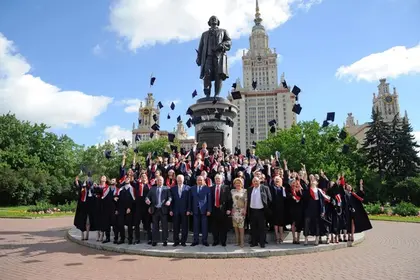In echoes of Soviet times, when contact between Russian and foreign institutions was strictly controlled, Moscow has begun to collect information on academics who interact with their external counterparts.
The independent investigative outlet Mozhem Obyasnit reported on Thursday that Russia’s Education and Science Ministry had issued a directive to universities to submit records on students and academics who had participated in international scientific events over the last year.
JOIN US ON TELEGRAM
Follow our coverage of the war on the @Kyivpost_official.
The instruction included a fill-out form in which to register “detailed information about the contingent of participants at international congress and exhibition events organized or attended by a Russian academic or scientific institution.”
Mozhem Obyasnit, quoted an anonymous source from Russia’s Education and Science Ministry who said that the drive to collect data on academics and students with foreign contacts was twofold. In addition to identify and crack-down on “inappropriate contacts” to highlight those at risk but also to enable Russia’s State Security Services, the FSB or SVR, to use the lists to recruit potential agents.
“This is a timeless Soviet practice when [academics] are sent abroad for illegal undercover work either as students or immediately afterward,” the source said.
This crack-down comes after the UN Office for Human Rights (OHCHR) said in July that there had been an inordinate rise in the number of Russian arrests and convictions for treason and espionage since the 2022 full-scale invasion of Ukraine.

Trump’s Russia Plan – Will It Work? NATO, Putin & US Strategy Explained
In the same month Russia’s independent news website Kholod reported that criminal investigations in the first seven months of the year were being instigated at a rate of one a day – a four-fold increase on the pre-2022 war figures.
The outlet said the actual number was likely to be much higher as, citing Russia’s Perviy Otdel human rights project, a number of investigations are not made public. Yevgeny Smirnov from the organization said, “The FSB has picked up its pace [in 2023] – we get 20 criminal cases a month on average.”
On the grounds that treason and espionage cases deal with classified information they are invariably held behind closed doors in Russia. An April amendment to the law, signed by President Putin, now can impose a maximum 20-year sentence for espionage and life imprisonment for “high treason.”
Kholod said that in the 20-year period 1997-2017, Russian authorities launched a total of 101 prosecutions, citing a 2018 report by legal group Team 29 – which had been founded by the imprisoned politician Alexei Navalny and had since disbanded.
Two high profile cases in 2023 involved scientists working on some of the most sensitive, defense-related work.
According to the Moscow Times, Viktor Ilyin, a scientist at a Russian nuclear research facility in the in the closed town of Serov in the Nizhny Novgorod region was sentenced to nine years in prison on charges of engaging in espionage activities on behalf of Ukraine, the US and Britain.
In May, three scientists, Anatoly Maslov, Alexander Shiplyuk and Valery Zvegintsev, key figures in Russia’s hypersonic weapons program, were arrested and charged with treason. Their colleagues said the accusations were groundless and arose because they spoke at foreign conferences, published magazine articles and participated in international projects.
A breakdown of the 82 treason cases launched between January and July shows that 59 were accused of acting on behalf of Ukraine, three accused of working for China, two for the US and one each for the UK and Germany.
The geography of cases has also changed - a review of open-source material shows 17 investigations in Moscow with 51 in 28 other regions, as well as 11 in annexed Crimea and the occupied Ukrainian territories. Statistics show before the launch of the war against Ukraine 90 percent of espionage cases originated in the Russian capital.
You can also highlight the text and press Ctrl + Enter










